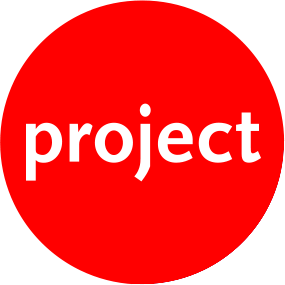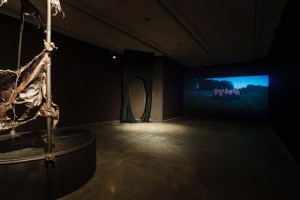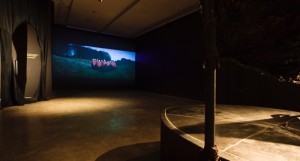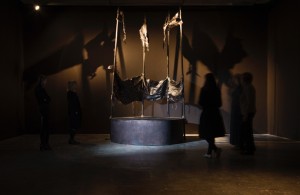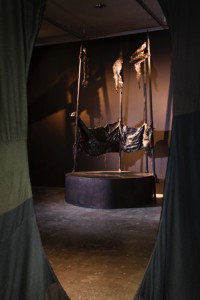Project Arts Centre presents
Clodagh Emoe
Curated by Tessa Giblin
A Project Arts Centre commission
Clodagh Emoe will present a space filled with the essence of ritual, where events – occult or banal – are bound to take place. Emoe’s solo exhibition includes structure, video, tapestry and sound, and builds a world informed by tropes of mysticism, the cult of engagement and Greek theatre.
If there was to be one overseeing eye which has guided or managed the decisions in Clodagh Emoe’s Cult of Engagement, it would be Papa Legba, god of the cross-roads. The gathered elements within the space of Cult of Engagement – ‘The Approach’, ‘Azimuth’ and ‘Parados’ – may appear to take historically recognisable roles. A stage resembling the later, travelling adaptations of Greek Theatre during the twilight of its form, or the Chorus, looming out of the semi-darkness, echoes an ancient role of revelation and discourse. Papa Legba, who was called upon to open communications between the deities and the people, was able to speak all known languages and controlled the doorway of communication at the spiritual crossroads. Some of this attitude has found its place in Emoe’s atmospheric installation, which at once reveals a route of procession and at the same time removes any presence of performance. If one were to enter through ‘The Appraoch’ – a large, perforated curtain – and call to Papa Legba for advice, the silence of his reply would only heighten the unnerving sense of expectation in the room, an expectation underlined by a low, reverberating, depth of sound.
This sound which fills the room is part of the event approach to exhibition making that Emoe has followed in the months leading towards her solo exhibition at Project Arts Centre, attempting to create a space that might be governed by an indiscernable force, and where something was bound to take place. The artist has been informed by a history of ritualistic induction and theatrical devices, and desires to herald a community as something other than a limited audience. ‘Azimuth’, a round, wooden stage with carved and stained markings are flanked by a by series of flags – petrified as monuments of kairos, a concept used by the ancient Greeks to describe time that is neither chronological or representable, but that spans an event or action. The markings on this stage remind us of the messages and meaning that are meant to be delivered to an initiated spectator imagined beyond the capabilities of human perception: through aerial archaeology we can listen to the thoughts of the past as they speak in supplication to the unknown greatness of whatever was thought to be watching. This is the context into which an unannounced chorus emerges slowly out of the twilight of the witching hour, becoming present in the space where we least expect them.
In the early days of Greek tragedy the chorus would enter the space of theatre through the paradoi, stage-flanking processional routes. The chorus evolved from the Dithyrambic chorus, a band of transformed people, for whom their social past and civic position was consciously and entirely forgotten in the worship of Dionysus. As Greek tragedy evolved the role of the chorus moved to the periphery of the activity, although their position became more influential. The chorus was a united body, able to reveal elements of truth, unknown as yet by the actors themselves. Thus the chorus were the eyes and the mirror of the audience, able to see in, around, and through the action taking place on the stage. ‘Parados’, the chorus of the Cult of Engagement, has a more ambiguous character – it is united in silence and like an unreadable congregation, indeciferable in its purpose – neither revealing, nor concealing.
Click here for a review of the show
Events
The Long Dark Night
A vibrant evening of lectures and performance with Mark Fisher and Sally O’Reilly, within the exhibition
Cult of Engagement – Clodagh Emoe
Introduced and chaired by Edia Connole
Generously supported by GradCAM
“The long dark night of the end of history has to be grasped as an enormous opportunity. The very oppressive pervasiveness of capitalist realism means that even glimmers of alternative political and economical possibilities can have a disproportionate great effect. The tiniest event can tear a hole in the grey curtain of reaction which has marked the horizons of possibility under capitalist realism. From a situation in which nothing can happen, suddenly everything is possible again.”
(Mark Fisher, Capitalist Realism, 2009)
Mark Fisher and Sally O’Reilly have been brought together within the environment of Cult of Engagement to discuss and perform their ideas, claiming the agency of the stage, lectern, or screen and leading a discussion to provoke and entertain.Mark Fisher examines the pervasive sense of resignation that results from our contemporary situation in his recent publication Capitalist Realism. The term Capitalist Realism, previously used in the mid 80’s by Michael Schudson, has been expanded by Fisher to describe the “invisible barrier constraining thought and action” prevalent in Western contemporary society. In refusing to accept that there are no alternatives, this session seeks to examine ways of challenging the situation of capitalist realism to enable the formation of an alternative, (collective) political subject. Sally O’Reilly is reviving the format of the Living Newspaper, a musical theatrical form used by the Soviet state to deliver practical information to the illiterate proletariat and later adopted as an educational tool by the US government during the Great Depression. Winkling a relevant theme from Cult of Engagement, O’Reilly will develop a chapter of an instructional manual to be delivered as a cinematic spectacular with live musical accompaniment. This session will comprise a lecture on the historical and cultural context of the Living Newspaper, as well as a scratch performance from the production in process.
Biographies
Clodagh Emoe, currently a research scholar at GradCAM, Dublin, has been awarded international residencies at IMMA, Dublin, The Banff Centre, Canada and the VCCA, U.S.A. Recent projects/events include, Mystical Anarchism (with Simon Critchley), Come Together, Douglas Hyde Gallery, Dublin, The Approach, Mart House Gallery, Amsterdam, An Exhibition in Five Chapters, CAC, Vilnius, Beyond The Country, Lewis Glucksman Gallery, Cork and Somewhere Here, NSCAD, Canada.
Mark Fisher is a writer, teacher and theorist. His writing regularly features in Frieze, New Statesman, The Wire and Sight &Sound 2009. He is a founding member of the Cybernetic Culture Research Unit. He is currently a visiting Fellow in the Centre for Cultural Studies, Goldsmiths and a tutor of philosophy at City Literature Institute, London. His weblog can be found at https://k-punk.abstractdynamics.org/. His most recent publication Capitalist Realism, Is There No Alternative, was published in 2009 by O Books, UK.
Sally O’Reilly is a writer, contributing regularly to many art and culture publications, including Art Monthly, Cabinet, Frieze, Art Review and Time Out, and has written essays on emerging and established artists for international galleries and museums. Her book The Body in Contemporary Art was published by Thames & Hudson in 2009 and she was co-editor of the thematic, interdisciplinary broadsheet Implicasphere (2003-8). She is also a dean of Brown Mountain College of the Performing Arts, an itinerant platform for the production of performative events, and co-curator of the Hayward Gallery Touring Exhibition ‘Magic Show’.
Edia Connole studied at the National College of Art and Design (NCAD) Dublin. She graduated in 2008 with a BA Hons in Fine Art Print (first class), and went on to do an MA in Art in the Contemporary World: NCAD ACW (theory only pathway). She is a regular contributor to the ACW website (acw.ie) and is an associate researcher at the Graduate School of Creative Arts and Media (GradCAM) where she attends biweekly seminars: the Event, the experiential: re-reading aesthetics and Pedagogy and Praxis. Recent projects/events include: Cult of Engagement: An Interview with Clodagh Emoe (2009); Mystical Anarchism, Clodagh Emoe and Simon Critchley (2009), (researcher); Of Publics and Pedagogies, Irish Pavilion, Venice Biennale (2009), (NCAD ACW/ GradCAM researcher).
Disclaimer
Closed Sundays & Bank Holidays
